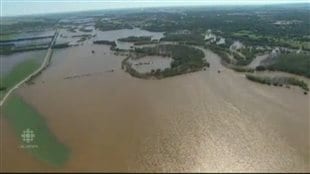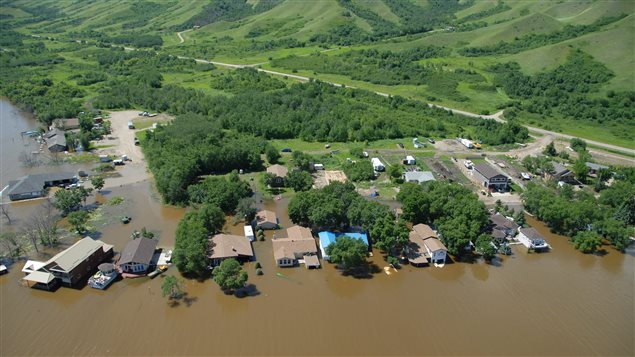The record-breaking flooding in western Canada is “absolutely uncommon” and “unprecedented,” and it is consistent with changes in the climate, says Prof. John Pomeroy, director of the Centre for Hydrology at the University of Saskatchewan. The provinces of Saskatchewan and Manitoba are battling unusual floods now, and the province of Alberta suffered record-breaking floods last year at this time.

‘Absolutely uncommon’ rainfall and flooding
Canada’s prairies are normally cold in winter and semi-arid in summer and, in the past, sporadic flooding has occurred most often in April as a result of snow melting and running over land too frozen to absorb it. Now flooding occurs in June and July when the temperature is 20 or 30 degrees Celsius, and it comes as a result of unusual rainfall patterns.
Listen“I know that it’s something (flooding caused by rain) that’s common in the rest of the world, but it’s absolutely uncommon in western Canada,” says Pomeroy. “It’s actually caused a really big problem because of the unexpectedness of it and also because it’s the largest flood on record in many parts of the Canadian Prairie Provinces.”
Storms used to be brief
The unusual flooding is consistent with a changing climate that has been occurring since the 1940s, he says. The frequency of multiple-day rainfall events over the prairies has increased in some places by 50 per cent.
“In the past we would get thunderstorms that would come in, last an hour or two, maybe half a day at most. They could be destructive, they could wreck part of a town or cause hail which would damage crops but they were generally in a very small area and too small of an area to cause flooding beyond a few wet basements.
Stalled weather systems wreaking havoc
“This storm is different. It’s large and it stayed for several days and it kept raining and raining and raining over an area of hundreds and hundreds of kilometres across. And that’s really different because it means that a large frontal weather system stalled over the prairies and kept dumping this precipitation. That simply did not happen as much in the past,” notes Pomeroy. He says this is very much indicative of climate change.
In the same area, the winters have warmed up by five degrees Celsius since the 1940. The spring snow-melt period is three weeks earlier and March, which used to be a snowy month, has become a rainy month.

Weather system cause floods around the world
These many changes are consistent with changes occurring around the world, says Pomeroy. The stalling of weather systems like this has been attributed to warming in the Arctic Ocean, he says, and caused flooding in Canada’s Rocky Mountains and the city of Calgary last June, which was the costliest natural disaster in Canadian history.
Stalled weather systems are believed to have also caused the flooding in Boulder, Colorado in September of last year, as well as in the Pyrenees last year, in the European Alps and the Himalayas (causing thousands of deaths), and record flooding in the U.K. earlier this year. “And what was called the polar vortex over eastern Canada and the eastern United States this winter caused record cold snaps. So we’re seeing these things all over the place, whether they’re long droughts in Australia or summer floods in western Canada,” says Pomeroy.
Time to stop arguing and do something, says scientist
Climate deniers may continue to dispute the view that greenhouse gases are causing climate change, but Pomeray says “When you see a weather event that had never occurred before and the worst flooding in history coming in a way that floods have never come before, we know we’re seeing a new climate now and the manifestations of this climate.
“So I think it’s time to stop worrying about whether this is climate change and start to take rapid action on this because it’s very expensive both in economic but also in human and social terms. These floods can kill people and they certainly destroy their lives, even if there are no fatalities.”







For reasons beyond our control, and for an undetermined period of time, our comment section is now closed. However, our social networks remain open to your contributions.